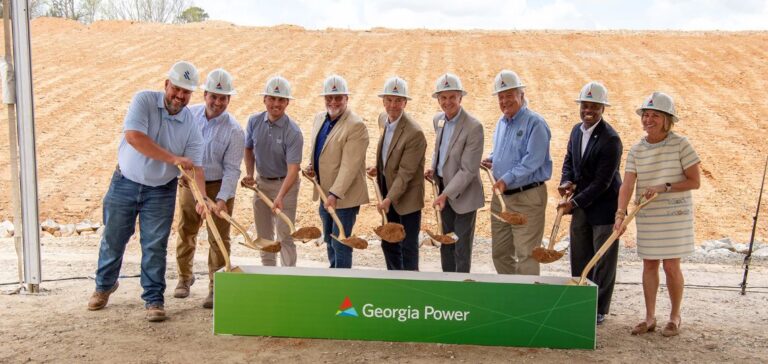Georgia Power Company announced on May 7 the start of construction on four Battery Energy Storage Systems (BESS) projects with a combined capacity of 765 megawatts (MW) across Bibb, Lowndes, Floyd and Cherokee counties in the United States. These facilities were approved through the Integrated Resource Plan (IRP) process by the Georgia Public Service Commission (PSC).
Strategically located projects to maximise existing infrastructure
The Robins BESS project in Bibb County will deliver a capacity of 128 MW. It is co-located with a solar facility adjacent to Robins Air Force Base. This location allows the reuse of existing transmission infrastructure, avoiding costs and delays linked to new interconnection works. The project is being developed by Burns & McDonnell, with commercial operations expected in June 2026.
The Moody BESS project in Lowndes County follows a similar model with 49.5 MW installed near Moody Air Force Base. Engineering and construction are being carried out by Crowder Industrial Construction, with a planned commercial operation date in May 2026.
Repurposed industrial sites and planned expansion
In Floyd County, Georgia Power is repurposing the former coal-fired Plant Hammond site to install 57.5 MW of battery storage. The Hammond BESS project leverages existing network connections to optimise costs. Construction is being managed by Crowder Industrial Construction, with operations set to begin in November 2026.
The largest project, McGrau Ford Phase I & II BESS, will be located in Cherokee County with a combined capacity of 530 MW. Both phases will use land already acquired by the company and benefit from contractual synergies with Burns & McDonnell, the engineering, procurement and construction contractor. The preliminary design allows for cost-effective expansion of the existing substation and generation tie line.
Flexible capacity to meet rising energy demand
According to Georgia Power, these new installations will address power needs during critical periods, particularly in winter, by storing surplus energy from intermittent renewable sources. In 2024, the company brought its first BESS site online at Mossy Branch near Columbus.
Rick Anderson, senior vice president and senior production officer at Georgia Power, stated: “As Georgia’s population and energy needs continue to grow, we are investing in technologies that support a more reliable and resilient grid.”






















